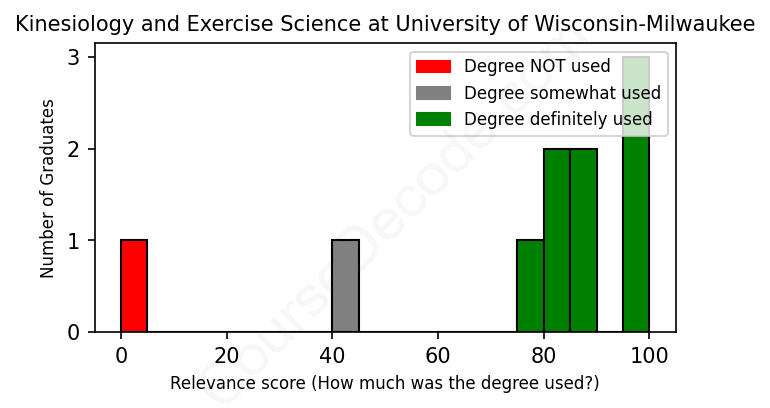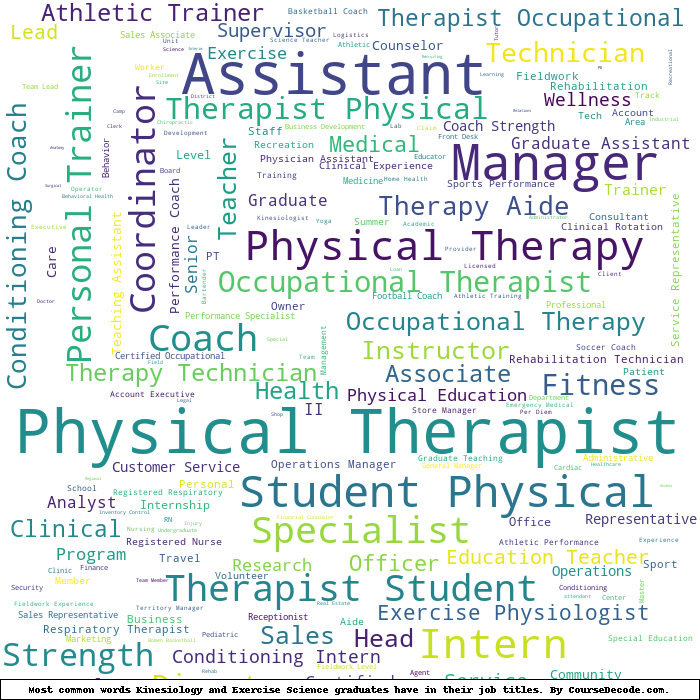
First, some facts. Of the Kinesiology and Exercise Science graduates from University of Wisconsin-Milwaukee we've analyzed , here's how many have used (or NOT used) their degree in their career:

These are estimates based on AI analysis of 10 LinkedIn profiles (see below).
The verdict? Above average. Overall, with an average relevance score of 75%, Kinesiology and Exercise Science graduates from University of Wisconsin-Milwaukee have a higher likelihood (+8%) of finding work in this field compared to the average graduate across all fields:
And for comparison, here's the chart for all profiles we've looked at across all degrees.
Also, after graduating, 40% of these graduates have pursued further education other than another Bachelor's degree (such as a Masters degree or other), compared to the average across all profiles of 35%. This suggests you may need more than just a Bachelors degree to be competitive as a Kinesiology and Exercise Science graduate.
See the details:
|
Relevance score: 77% We think this person has gone into a career highly relevant to their degree. We think this person has gone into a career highly relevant to their degree.
DEGREE INFOGraduated in 2016 from University of Wisconsin-Milwaukee with a Bachelors Degree in Kinesiology and Exercise Science. No other secondary education since. JOB HISTORY SINCE GRADUATIONCorporate Wellness Intern Interra Health, Inc. May 2016 - Aug 2016 Wellness Program Coordinator  Aurora Health Care Aug 2016 - Nov 2016 Wellness Coordinator  St. Camillus Mar 2017 - Present Arbonne Independent Consultant  Arbonne Dec 2017 - Present ABOUTI hope to be able to express my passion for health and fitness in a professional environment. |
The top 10 most common jobs done by the graduates we've analyzed (ranked most common to least) are:
If you take a look at the job paths of graduates with a degree in Kinesiology and Exercise Science from the University of Wisconsin-Milwaukee, a mix of careers appears, but certain themes emerge. Many graduates end up in roles like Personal Trainers, Exercise Physiologists, and positions in rehabilitation or fitness management. These jobs clearly connect to their studies, allowing them to apply their knowledge about exercise, human physiology, and health in real-world settings. For example, being a Personal Trainer or Fitness Manager revolves around developing tailored exercise and wellness programs, which is right in line with what they learned in school.
However, not all career paths are directly relevant to Kinesiology and Exercise Science. Some graduates find themselves in roles like Sales Consultant or Patient Access Representative, which don't rely heavily on their specialized training. While some skills like teamwork or customer service can be valuable in these jobs, they don't directly apply the core concepts from their degree. Overall, although there's a strong tendency toward jobs that utilize their Kinesiology training, there's also a noticeable number of graduates drifting into completely unrelated fields, showing that the specific degree doesn’t always dictate career choice.
Here is a visual representation of the most common words in job titles for Kinesiology and Exercise Science graduates (this is across all Kinesiology and Exercise Science graduates we've analyzed, not just those who went to University of Wisconsin-Milwaukee):

Graduates from the University of Wisconsin-Milwaukee with degrees in Kinesiology and Exercise Science seem to have a pretty diverse range of career trajectories. Many of them start off in roles that are related to health, exercise, and physical therapy, which makes sense given their backgrounds. For their first jobs after graduation, positions like Exercise Physiologist, Fitness Coach, or even roles in hospitals and wellness programs are common. This indicates that right out of school, there's a solid move into fields that utilize their knowledge and skills in kinesiology. However, there are also examples of graduates taking jobs that seem to stray a bit from the core focus of their degree, like working in plumbing or security. That being said, these off-path jobs do not appear to be the majority.
If we look at where they end up after five or ten years, many seem to carve out solid careers in fitness, rehabilitation, and wellness sectors. Plenty of graduates find themselves in roles like Cardiac Sonographers, Athletic Trainers, or even advancing to positions like Program Directors in educational institutions. There are also some who transition into independent coaching or wellness consulting, which shows a shift towards entrepreneurship in health and fitness. However, the varied success of the graduates is pretty evident; while many are thriving in relevant fields, some have taken jobs that don't leverage their degrees. All in all, it seems like a mixed bag—there are definitely success stories, but some find themselves in less relevant careers as well.
Getting a Bachelor’s degree in Kinesiology and Exercise Science can be a bit of a mixed bag, but it generally falls somewhere in the middle in terms of difficulty. You'll definitely be hitting the books with subjects like anatomy, physiology, and exercise science principles, which can be challenging if you're not super into the sciences. That said, if you have a passion for fitness and understanding the human body, you'll likely find a lot of it intriguing and rewarding. The courses often involve practical hands-on experiences, which can break up the more rigorous coursework and make it more enjoyable. Overall, it’s not as easy as some majors, but if you stay organized and engaged, you can definitely handle it!
Most commonly, in the LinkedIn profiles we've looked at, it takes people 3 years to finish a Bachelor degree in Kinesiology and Exercise Science.
Looking at the job histories of these Kinesiology and Exercise Science grads from UW-Milwaukee, it seems like they've landed a mix of decent gigs but might not be rolling in dough, especially when starting out. The earlier careers in exercise physiology or as fitness staff at places like the YMCA generally don’t pay super high, while positions like cardiac sonographers and fitness managers offer better salaries, especially with experience. The recent grads, like the one at Stryker, are just kicking off, so it's hard to say if they're making bank yet. Overall, while some have made solid career strides, there’s a good chance others are still working their way up. It’s kind of a classic story in health and fitness fields—great passion but the pay can be spotty until you hit the right level!
Here is a visual representation of the most common words seen in the "about" section of LinkedIn profiles who have a Bachelor degree in Kinesiology and Exercise Science (this is across all Kinesiology and Exercise Science graduates we've analyzed, not just those who went to University of Wisconsin-Milwaukee). This may or may not be useful:

Here are all colleges offering a Bachelor degree in Kinesiology and Exercise Science (ordered by the average relevance score of their Kinesiology and Exercise Science graduates, best to worst) where we have analyzed at least 10 of their graduates: